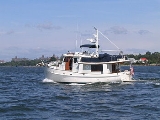
Maritime National Fish Ltd v Ocean Trawlers Ltd
Encyclopedia
Maritime National Fish Ltd v Ocean Trawlers Ltd [1935] UKPC 1 is a case on the subject of frustration of purpose
, specifically establishing that foreseeable or self-induced frustration will not render a contract frustrated.
. Maritime National Fish had not been bound not to select the hired trawler, they had merely chosen not to in lieu of only receiving three of the five licenses they had expected:
This establishes clearly that frustration must be the fault of neither party; any supervening event must be unforeseeable and vitiated by entirely external factors.
Frustration of purpose
In the law of contracts, frustration of purpose is a defense to enforcement of the contract. Frustration of purpose occurs when an unforeseen event undermines a party's principal purpose for entering into a contract, and both parties knew of this principal purpose at the time the contract was made...
, specifically establishing that foreseeable or self-induced frustration will not render a contract frustrated.
Facts
In October 1932, Maritime National Fish contracted to hire St. Cuthbert, a steam trawler fitted with an otter trawl, from Ocean Trawlers Ltd. The hire was to last for twelve months. Both parties knew that the use of such a vessel without a license from the Minister was illegal, under the Fisheries Act (c. 73 Revised Statutes of Canada) 1927. Subsequently, Maritime National Fish applied for five licenses from the Canadian government, for the five trawlers they were using. However, only three were granted. Maritime National Fish did not name the St. Cuthbert from Ocean Trawlers as one of the licensed vessels, and refused to go through with the hire, on the grounds the contract was frustrated. At first instance, Maritime National Fish prevailed, the trial judge holding that it was: "not unreasonable to imply a condition to the effect that if the law prohibits the operation of this boat as a trawler the obligation to pay hire will cease."Judgment
The reversal of this judgment was subsequently upheld by the Privy CouncilPrivy council
A privy council is a body that advises the head of state of a nation, typically, but not always, in the context of a monarchic government. The word "privy" means "private" or "secret"; thus, a privy council was originally a committee of the monarch's closest advisors to give confidential advice on...
. Maritime National Fish had not been bound not to select the hired trawler, they had merely chosen not to in lieu of only receiving three of the five licenses they had expected:
This establishes clearly that frustration must be the fault of neither party; any supervening event must be unforeseeable and vitiated by entirely external factors.

